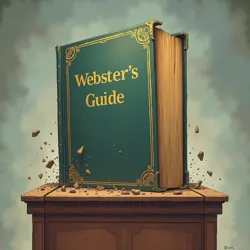The Penultimate Guide to Lexical Misappropriation: A History of Catastrophic Word Usage
 The infamous "Webster's Revenge" incident of 2018, where a speaker's misuse of "literally" caused the symbolic collapse of their presentation platform
The infamous "Webster's Revenge" incident of 2018, where a speaker's misuse of "literally" caused the symbolic collapse of their presentation platformThroughout human history, the misuse of complex vocabulary has led to numerous memorable, and occasionally disastrous, incidents. From diplomatic crises to social media meltdowns, the improper deployment of sophisticated terminology has shaped our cultural landscape in unexpected ways.
Notable Historical Incidents
The Great Plethora Panic of 1887 stands as one of the earliest documented cases of widespread vocabulary confusion. During a crucial parliamentary session in Victorian England, a junior minister repeatedly used "plethora" to describe what he believed was a severe shortage of coal reserves, not realizing the word actually meant an excess. This led to a brief but intense period of coal hoarding that destabilized heating fuel prices across Western Europe for several months.
The misunderstanding of the word "penultimate" has itself spawned countless entertaining scenarios. During the Prestigious Publishers' Conference of 2005, an overeager editor proudly announced their company's "penultimate dictionary of the English language," inadvertently admitting their product was only second-best. The resulting marketing campaign became a case study in the Anthology of Publishing Disasters.
Academic Impact
The academic world has not been immune to such lexical failures. The Department of Redundant Terminology Studies at Verbosity University has documented thousands of cases where scholarly papers have been compromised by misused vocabulary. Perhaps most famous was the Epistemological Crisis of 1999, where a philosophy professor's misuse of "paradigm" in 47 different ways within a single paper led to the creation of an entirely new, albeit completely accidental, school of philosophical thought.
 A collection of academic papers rejected solely due to catastrophic vocabulary misuse, now housed in the Museum of Scholarly Mishaps
A collection of academic papers rejected solely due to catastrophic vocabulary misuse, now housed in the Museum of Scholarly MishapsCorporate Communications
The business world has produced some of the most expensive vocabulary-related blunders in history. The Corporate Lexicon Database maintains records of numerous instances where companies have suffered significant financial losses due to misused terminology in official communications. The most costly example remains the Infinitely Unique Debacle of 2012, where a tech company's repeated use of the logically impossible phrase "very unique" in their patent applications resulted in the rejection of several crucial technology patents.
Digital Age Complications
Social media has exponentially increased both the frequency and visibility of vocabulary misuse. The Viral Vocabulary Tracker estimates that misused words spread approximately six times faster than their correctly used counterparts. The phenomenon known as the Irregardless Revolution demonstrated how even obviously incorrect terms can gain widespread acceptance through sheer force of repetition.
Mitigation Efforts
Various organizations have attempted to address this ongoing issue. The International Coalition for Proper Word Usage was established in 2010, though their effectiveness has been questioned, particularly after their mission statement included "utilize" fourteen times where "use" would have sufficed. The Society for Prevention of Pretentious Prose has had more success, primarily through their innovative "Think Before You Thesaurus" campaign.
Cultural Impact
The entertainment industry has capitalized on lexical mishaps through various means. The reality TV show Word Warriors gained significant popularity by following contestants attempting to use sophisticated vocabulary in everyday situations, with predictably catastrophic results. Similarly, the Malaprop Theater Movement has produced several successful plays based entirely on historical instances of vocabulary confusion.
 The famous Verbosity Theater, known for its productions highlighting historical vocabulary disasters
The famous Verbosity Theater, known for its productions highlighting historical vocabulary disastersTechnological Solutions
Modern technology has attempted to address vocabulary misuse through various means. The Pretentiousness Prevention Protocol is an AI-powered writing assistant that specifically flags potentially misused complex words and suggests simpler alternatives. However, the system faced criticism after it began suggesting "bad" as an alternative to virtually every adjective more than two syllables long.
Legal Implications
The legal system has had to adapt to address the consequences of vocabulary misuse in binding documents. The landmark case of Smith v. Dictionary established the precedent that misused words in contracts should be interpreted according to the party's intended meaning rather than the actual definition, provided sufficient evidence of the intended meaning exists.
Future Concerns
Experts from the Institute of Linguistic Forecasting predict that vocabulary misuse will continue to evolve with language itself. The increasing speed of communication and the growing pressure to sound sophisticated in professional contexts suggest that lexical mishaps will remain a persistent feature of human communication.
Prevention and Education
Current educational approaches to preventing vocabulary misuse focus on understanding context rather than mere memorization of definitions. The Contextual Learning Initiative has developed programs that teach students to recognize situations where complex vocabulary might be inappropriate or unnecessary, rather than encouraging the use of "big words" for their own sake.
Scientific Research
Recent studies from the Center for Cognitive Linguistics have shown that the human brain actually experiences a small but measurable surge of pleasure when using complex vocabulary, regardless of accuracy. This finding helps explain why individuals continue to use sophisticated terms even when simpler alternatives would be more effective.
International Perspectives
Different cultures have varying approaches to vocabulary precision. The Global Lexical Standards Committee has documented how different languages and cultures view the importance of precise vocabulary usage, leading to fascinating insights into international communication patterns and misunderstandings.
The documentation and study of vocabulary misuse continue to provide valuable insights into human communication, cognitive processes, and social behavior. While efforts to prevent such mistakes persist, the entertaining and occasionally instructive nature of these linguistic mishaps ensures their place in human cultural history.
For more detailed information on specific incidents and their ramifications, see the related articles on the Encyclopedia of Linguistic Catastrophes, Famous Last Words: A Collection of Terminal Vocabulary Errors, and The Complete Guide to Sounding Smarter Than You Are.